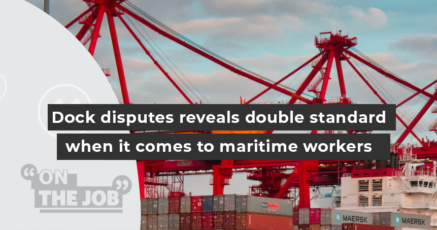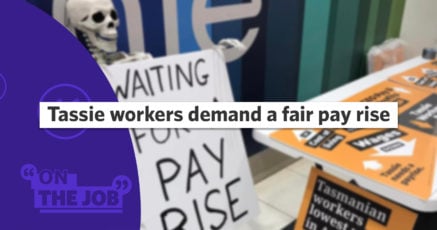The net has started to close on big-tech companies who have denied their workers’ rights with sophisticated sham contracting, following a landmark workers compensation decision in Sydney.
Xiaojun Chen, 43, was killed while riding his motorbike in the Sydney suburb of Zetland on September 29, 2020. He is survived by his wife and two children as well as his 75 year old father.
Chen died while delivering food for the Tech platform Hungry Panda. He has been recognised as an employee of the company under New South Wales workers’ compensation scheme.
The recognition was a significant one as normally couriers for food delivery apps like Hungry Panda, UberEats and Deliveroo tend to be classified as contractors rather than employees and thus are afforded less protection and benefits.
The Transport Workers Union (TWU) has sounded the alarm on the vulnerability of delivery drivers for years. A 2020 survey found that one in four riders had been in an accident while working.
We know these injuries and deaths are preventable.
Employee recognition a watershed moment
iCare workers’ compensation scheme insurance agent Employers Mutual Limited (EML) has this month agreed that Mr Chen was employed by HungryPanda when he died, meaning his family is now entitled to benefits.
It is a watershed moment in the ongoing battle to recognise “gig workers” as employees of the companies that they work for, and not just go it alone as small business operators, despite former prime minister Scott Morrison having insisted so.
Law firm Slater and Gordon represented Chen’s family. Slater and Gordon practice group leader Jasmina Mackovic described the outcome as a significant breakthrough.
“To our knowledge, this is the first case where there has been an admission that a gig economy driver has been considered a worker,” Mackovic said.
Gig economy workers and their families are usually denied any entitlements because they are considered independent contractors rather than employees, meaning they are unable to access workers’ compensation and other benefits such as annul leave and sick leave.
This also means that workers or their families are not guaranteed loss of wages payments, medical payments or a lump sum for any impairment suffered if they are injured or ill, or even in the case of death as has happened here.
Jasmina Mackovic
Practice group leader at Slater and Gordon

Gig worker exploitation needs a “legislative response”
The Transport Workers Union has been working tirelessly on this issue.
TWU National Secretary Michael Kaine told On the Job that this decision is part of a significant shift in attitudes on the plight of gig workers.
“What this workers compensation decision shows is that there is real momentum to ensure that workers don’t fall through the cracks”.
“I think it really is building on that momentum in the community to say that, if you’re a worker, you should have rights. And it shouldn’t matter what the legal label is, that applies to you,” he said.
“For too long, we’ve had this old-fashioned distinction between an employee in an employment relationship, who quite rightly gets all of the automatic rights that we’ve built up as a union movement over decades.”
“And the distinction is between that and independent contractors like food delivery riders who fall just on the other side of the legal divide and get nothing,” Kaine said.
Chen’s death was one of a spate of fatalities amongst deliver riders in Sydney in 2020, where six workers lost their lives whilst doing their job.
Kaine said these tragedies brought into sharp focus the dangerous job that these workers do, and the relentless pressure applied to them by the big-tech platforms that employ them.
They’re having to work too long and too fast to make a living. If they don’t get to their delivery on time, they get kicked off the app by an algorithm. These workers are providing for families. This notion that this is all about university students doing this for beer money just doesn’t stack up.
Michael Kaine
TWU National Secretary

In a statement, Chen’s widow Lihong Wei said the decision would bring “respect and recognition to all food delivery workers for the essential service they provide”.
“My children miss their daddy every day. My daughter has begun struggling with school and my son has lost his father forever at just eight years’ old. My father in-law has lost his only son. Nothing can ever fix this.”
Kaine is adamant that it is time for the new Albanese Labor Government to act on the issue of the exploitation of workers in the so-called gig economy.
“No one should have to fight through the courts just simply to establish that they’re entitled to workers’ rights. We need a legislative response.”
“Leading into the election, Tony Burke and Anthony Albanese announced that they would regulate to ensure that gig workers had rights,” Kaine said.
“What we need is a tribunal that has the capacity to look at work and gauge the level of reliance that the worker has on those that engage them and then apply rights, conditions and obligations that are attuned to that level of reliance.”
“That way, there’s no escaping the system and workers will have rights no matter what label we apply to them.”













SHARE:
Landmark ruling a huge win for gig workers